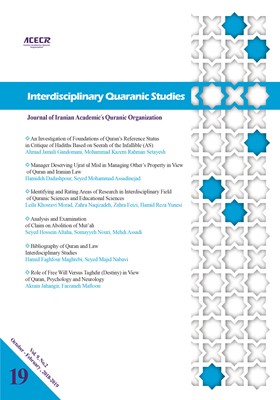Role of Free Will Versus Taghdir (Destiny) in View of Quran, Psychology and Neurology
Subject Areas : Quran and MedicineAKRAM jahangir 1 , farzaneh maftoon 2
1 -
2 -
Keywords: Predestination and Free Will Free Will Destiny Neurology,
Abstract :
The issue of predestination and free will has long been among the most basic issues in philosophy and debated by philosophers and thinkers. Some have believed in absolute predestination and some others, like Muʿtazila, believe in absolute free will. However, the saying “La jabr wala ikhtiar, bal amr-i bayn al-amrayn” (There is no free will or predestination, but the station in between) we have received from the Infallible Imams (AS) has been proven to be true in specialized neurology labs. In this paper, neurological studies about free will, related Quranic verses, and other psychological and neurological views related to the issue have been taken into consideration. Benjamin Libet is a neurophysiologist who discovered a new understanding of consciousness during his studies on the brain. He writes that the brain begins responding to an external stimulus before making a conscious decision (i.e., the response is already there, and this is what we call predestination). This paper cites from verses of the Quran, views of Carl Jung, and interpretations of poets Rumi and Hafiz on the issue of sublime predestination and destiny and then investigates neurology of transcendence in neuroscience. One can develop humanity’s horizons in terms of religious understandings by reflecting on them and their relation with new sciences.
آذربايجاني، مسعود و سالاري فر، محمد رضا (1385)، روانشناسي عمومي. تهران: زمزم هدایت وابسته به پژوهشکده علوم اسلامی امام صادق (ع).
آلوسی، سید محمود (1415ق). روح المعانى فى تفسير القرآن العظيم. بیروت: دارالكتب العلميه.
بروجردی، سید محمد ابراهیم (1366). تفسیر جامع (جلد ششم). تهران: انتشارات صدر.
بلخی، جلالالدین محمد (1375). مثنوي معنوي. تهران: انتشارات صفی علیشاه.
مصباح، علی؛ زارعان، محمد جواد؛ بی ریا، ناصر؛ آقا تهرانی، مرتضی؛ رهنمائی، سید احمد؛ شاملی، عباس؛ حقانی، ابوالحسن و ساجدی، ابوالفضل (1374). روانشناسي رشد با نگرش به منابع اسلامي (جلد اول). تهران: سازمان سمت.
روحاني حائري، سيد علي (1395). فيزيولوژي اعصاب و غدد درون ريز. تهران: سمت.
زماني، كريم (1382). ميناگر عشق. تهران: نشر ني.
صداقت، محمد عارف (1390). جبر و اختیار در مکاتب روانشناسی موسسه فرهنگی بشارت. برگرفته از وبسایت: http://www.bsharat.com/id/1/2/1jabr.html.
طباطبایی، محمدحسین (1374). المیزان فی تفسیرالقرآن. قم: دفتر انتشارات اسلامی.
طبرسی، فضل بن حسن (1360). مجمع البیان فی تفسیر القرآن. تهران: فراهانی.
قزوینی علامه و غنی، قاسم (1382). ديوان حافظ. تهران: انتشارات طلایه.
كاشاني، عزالدين (1367). مصباح الهدايه. تهران: موسسه نشر هما.
گلمن، دانيل (1387). هوش هيجاني (ترجمه: نسرين پارسا). تهران: انتشارات رشد.
گنابادى، سلطان محمد (1408ق). تفسير بيان السعادة فى مقامات العبادة. بیروت: مؤسسة الأعلمي للمطبوعات.
گوستاو يونگ، كارل (1390). روانشناسي و كيمياگري (ترجمه: پروين فرامرزي). مشهد: انتشارات آستان قدس رضوي.
مکارم شیرازی، ناصر و دیگران (1374). تفسیر نمونه. تهران: دار الکتب الاسلامیه.
مطهري، مرتضي (1370). مجموعه آثار (جلد اول). قم: صدرا.
نيك بخت، ناصر(1381). بررسي ديدگاه مولوي در كسب راز قضا و قدر. مجله دانشكده ادبيات و علوم انساني دانشگاه تهران، 164، 137-139.
Libet, Benjamin (1999). Do We Have Free Will?. Journal of Consciousness Studies.6(8-9), 47–57 Libet, Benjamin (2004). Mind Time: The Temporal Factor in Consciousness. Cambridge: Harvard University Press.


